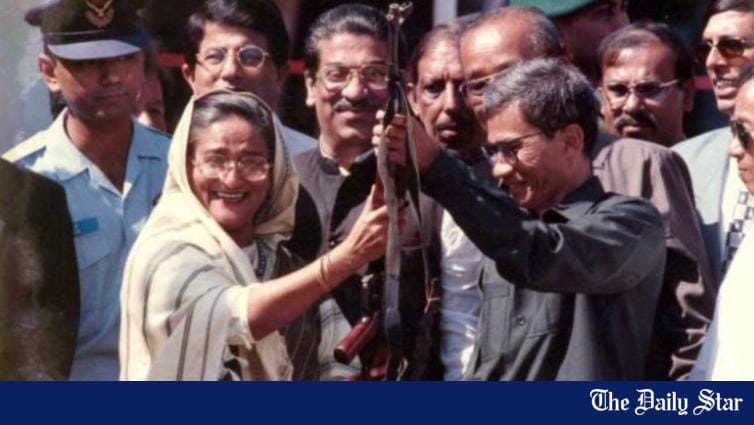Parallel economy of rent seeking key barrier to establishing peace in CHT: Speakers
CHT peace crucial for stability in neighbouring states, they say
FE ONLINE REPORT
Published :
Jan 06, 2025 20:02
Updated :
Jan 06, 2025 20:14
Diplomats, former army officers, and academics on Monday noted that the operation of a parallel economy driven by rent-seeking by certain groups is a major challenge to achieving peace in the Chittagong Hill Tracts (CHT).
They also recommended addressing the interests of all stakeholders for the full implementation of the Chittagong Hill Tracts Peace Accord of 1997.
The experts highlighted land ownership issues, lack of communal harmony, and the parallel economy as thorny matters that pose obstacles to the full implementation of the treaty.
They were speaking at the launching ceremony of the book titled "Regional Security and CHT Peace Accord 1997: An Unfinished Peace Building Model of Bangladesh" by Brigadier General Md Nasimul Gani, held at the Foreign Service Academy.
Md Touhid Hossain, Foreign Adviser, and Lt Gen Abdul Hafiz (retd), Special Assistant on Defense and National Integration Development to the Chief Adviser of the Interim Government of Bangladesh, were the chief guest and special guest, respectively. Professor Salimullah Khan and the author also spoke at the event.
The Foreign Adviser emphasised the need to involve all stakeholders in the CHT region to ensure peace there.
“The unfinished peace-building effort needs to be completed," he said, adding, “You don’t have to finish it in a day, but action must be taken so that peace can return to the CHT."
He also mentioned that detractors, acting in their own interest, would try to obstruct the peace-building process. However, he stressed that the country must continue on the right path to convince all groups in the hills that peace is in their best interest.
“When they come to know that peace is in their interest, they will support it," he said.
However, the adviser noted that the groups benefiting from the lack of peace in the CHT may oppose it.
In this context, he pointed out that a well-established system of rent-seeking already exists in the CHT.
He said that people in the region are forced to pay a regular fee to ‘people in uniform,’ explaining, “They come in uniform with a gun. They are not state actors, but they have the uniform and establishment, and they seek money. For them, this is the easiest way to live."
“So, there are two aspects to this: one is the security aspect, and the other is the economic aspect,” he added.
Special Assistant to the Chief Adviser, Lt Gen (Rtd) Hafiz, said that the author had served in the CHT for five and a half years and had first-hand experience of the conflict.
“The book is being published at a time when the interim government is facing security challenges in maintaining communal and social harmony in the CHT,” he noted.
Referring to recent unrest in the CHT, Gen Hafiz said, “In September, only four months ago, we witnessed significant commotion, agitation, and unrest. At least five or six advisers had to rush there when mob justice occurred, including killings, which triggered widespread violence over a few days.”
He went on to explain that the issues in the CHT, which have persisted since 1976 or even earlier, have multiple dimensions: “It has an ethno-religious dimension, a political dimension, as the ethnic groups want political identity and autonomy. It has a military dimension, stemming from insurgency and counterinsurgency, and it has deep-rooted issues regarding land ownership.”
On the land issue, Gen Hafiz said, “We need to decide who will own the land, and under what procedures the land ownership issue can be resolved.”
“There is also an economic dimension to the conflict,” he added.
Gen Hafiz noted that while the 1997 peace accord was assumed to bring long-term peace, after 27 years, peace has not been established.
“After 27 years, we do not see stability or security,” Gen Hafiz said. He also pointed out that the book by Brigadier General Gani highlights both the strengths and weaknesses of the peace accord and analyzes why many of the 72 clauses of the agreement have not been implemented over the years.
He also referred to the internal conflict within the UPDF, the non-signatory group to the peace accord, which has led to frequent casualties due to infighting.
“Moreover, there is an unabated toll collection and a parallel economy run by groups opposed to the peace accord,” he said.
Gen Hafiz stressed the importance of engaging the local community in peacebuilding efforts and noted that the book emphasises the need for both security operations and demilitarisation.
He pointed out that peace and stability in the CHT have broader implications for regional security due to its proximity to neighbouring countries. “What happens in the CHT impacts the same communities across the border in Mizoram and Nagaland, as well as in parts of Myanmar. Regional security and stability are crucial, not just for Bangladesh, but for the entire region,” he said.
He called for a collective effort from local communities, the government, and international partners, emphasising the need for people’s participation and consultation alongside the Bangladesh armed forces.
“We encourage further discussion among government agencies, security forces, and civil society to address these challenges,” Gen Hafiz added.
Professor Salimullah Khan pointed out that the current constitution lacks provisions to address the issue of self-respect for the hill people, as it refers to Bangladesh as the land of the Bengalis.
He suggested that the hill people need to be convinced that peace is in their best interest and criticised previous governments for taking measures that further alienated them, rather than bringing them into the fold.






 www.newagebd.net
www.newagebd.net













































